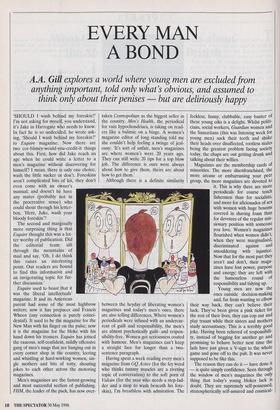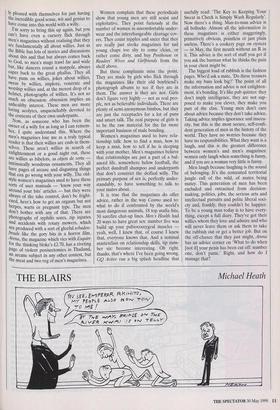EVERY MAN A BOND
A.A. Gill explores a world where young men are excluded from
anything important, told only what's obvious, and assumed to think only about their penises — but are deliriously happy
`SHOULD I wash behind my foreskin?' I'm not asking for myself, you understand, it's Jake in Harrogate who needs to know. In fact he is so undecided, he wrote ask- ing, 'Should I wash behind my foreskin?' to Esquire magazine. Now there are two cor-blimey-would-you-credit-it things about this. First, how did Jake reach an age when he could write a letter to a men's magazine without discovering for himself? I mean, there is only one choice, wash the little sucker or don't. Foreskins aren't complicated bits of kit, they don't even come with an owner's manual; and doesn't he have any mates (probably not in the procreative sense) who could shout through his letter- box, 'Here, Jake, wash your bloody foreskin'?
The second and marginally more surprising thing is that Esquire thought this was a let- ter worthy of publication. Did the editorial team sift through the mountains of mail and say, 'Oh, I do think this raises an interesting point. Our readers are bound to find this informative and an invigorating topic for fur- ther discussion.'
Esquire used to boast that it was the liberal intellectuals' magazine. It and its American parent had some of the most highbrow writers; now it has prepuces and Francis Wheen (any connection is purely coinci- dental). It used to be the magazine for the New Man with his finger on the pulse; now it is the magazine for the bloke with his hand down his trousers. Esquire has joined the raucous, self-confident, mildly offensive gang of men's mags that are hanging out in every corner shop in the country, leering and whistling at hard-working women, sin- gle mothers and bits of tatty, shouting jokes to each other across the motoring magazines.
Men's magazines are the fastest-growing and most successful section of publishing. FHM, the leader of the pack, has now over- taken Cosmopolitan as the biggest seller in the country. Men's Health, the periodical for vain hypochondriacs, is taking on read- ers like a bulimic on a binge. A women's magazine editor of long standing told me she couldn't help feeling a twinge of jeal- ousy: 'It's sort of unfair, men's magazines are where women's were 20 years ago. They can still write 20 tips for a top blow job. The difference is ours were always about how to give them, theirs are about how to get them.'
Although there is a definite similarity between the heyday of liberating women's magazines and today's men's ones, there are also telling differences. Where women's periodicals were infused with an undercur- rent of guilt and responsibility, the men's are almost psychotically guilt- and respon- sibility-free. Women got seriousness coated with humour. Men's magazines can't keep a straight face for longer than a two- sentence paragraph.
Having spent a week reading every men's magazine from GQ Active (for the fey weed who thinks tummy muscles are a riveting topic of conversation) to the soft porn of Vulcan (for the man who needs a step-lad- der and a mop to wash beneath his fore- skin), I'm breathless with admiration. The feckless, funny, clubbable, easy banter of these young oiks is a delight. Whilst politi- cians, social workers, Guardian women and the Samaritans (this was listening week for young men) suck their teeth and shake their heads over disaffected, rootless males being the greatest problem facing society today, the chaps are out getting drunk and talking about their willies. Magazines are the membership cards of minorities. The more disenfranchised, the more arcane or embarrassing your peer group, the more magazines are devoted to it. This is why there are more periodicals for coarse tench fishermen than for socialists, and more for aficionados of sex with women with huge bosoms covered in shaving foam than for devotees of the regular mis- sionary position with someone you love. Women's magazines flourished when women didn't, when they were marginalised, discriminated against and smouldering with injustice. Now that for the most part they aren't and don't, their maga- zines have lost power, purpose and energy; they are left with the humourless round of responsibility and tidying up.
Young men are now the ones outside decision-making and, far from wanting to elbow their way back, they can't believe their luck. They've been given a pink ticket for the rest of their lives, they can cop out and play truant while their sisters and mothers study accountancy. This is a terribly good joke. Having been relieved of responsibili- ty, instead of begging for another go and promising to behave better next time the lads have just given a V-sign to the whole game and gone off to the pub. It was never supposed to be like this. The reason they can do it — have done it — is quite simply confidence. Seen through the window of men's magazines the only thing that today's young blokes lack is doubt. They are supremely self-possessed, stratospherically self-assured and cosmical- IY pleased with themselves for just having the incredible good sense, wit and genius to have come into this world with a willy. I'm sorry to bring this up again, but you can't have even a cursory flick through Men's magazines without realising that they are fundamentally all about willies. Just as the Bible has lots of stories and discussions about this and that but always comes back to God, so men's mags trawl far and wide but, like dancers round a maypole, always caper back to the great phallus. They all have puns on willies, jokes about willies, swear by willies, implore, venerate and worship willies and, at the merest drop of a helmet, photographs of willies. It's not so much an obsession: obsession implies an unhealthy interest. These men are more loving acolytes, unquenchably devoted to the contents of their own underpants. Now, as someone who has been the owner of a willy for as long as I can remem- ber, I quite understand this. Where the men's magazines lose me as a truly typical reader is that their willies are ends in them- selves. These aren't willies in search of enlightenment or a good night out, these are willies as bibelots, as objets de vertu intrinsically wondrous ornaments. They all have pages of arcane and disgusting things that can go wrong with your willy. The old- style women's magazines used to have these sorts of user manuals — 'know your way around your bits' articles — but they were always of the take control, don't be fright- ened, here's how to get an orgasm but not herpes, warts or pregnant type. The men don't bother with any of that. There are Photographs of syphilis sores, zip injuries and accidents with rotary mowers, which are produced with a sort of gleeful schaden- freude like the gory bits in a horror film. Arena, the magazine which vies with Esquire for the thinking bloke's £2.70, has a riveting page of violent penisectomies in Thailand, an arcane subject in any other context, but the meat and two veg of men's magazines. Women complain that these periodicals show that young men are still sexist and exploitative. They point furiously at the number of women in uncomfortable under- wear and the interchangeable cleavage cov- ers. They count nipples and sneer that they are really just stroke magazines for sad young chaps too shy to come clean, or rather come dirty, and buy Penthouse or Readers' Wives and Girlfriends from the shelf above.
But these complaints miss the point. They are made by girls who flick through the magazines like their old boyfriend's photograph albums to see if they are in them. The answer is they are not. Girls don't figure very highly — not as real peo- ple, not as believable individuals. There are plenty of semi-anonymous bimbos, but they are just the receptacles for a lot of puns and smart talk. The real purpose of girls is to be the raw material for the far more important business of male bonding.
Women's magazines used to have rela- tionship talk: how to find a man, how to keep a man, how to tell if he is sleeping with your mother. Men's magazines believe that relationships are just a part of a bal- anced life, somewhere below football, the perfect dandruff shampoo and underpants that don't constrict the deified willy. The primary purpose of sex is, perfectly under- standably, to have something to talk to your mates about.
It is true that the magazines do offer advice, rather in the way Cosmo used to: what to do if confronted by the world's most dangerous animals, 18 top mafia hits, 50 surefire chat-up lines. Men's Health had 20 ways to have great sex: number five was build up your pubiococcygeal muscles yeah, well, I knew that, of course I knew that, everyone knows that. And a seminal masterclass on relationship skills, tip num- ber six: become interesting. Oh right, thanks, that's where I've been going wrong. GQ Active ran a big splash headline that usefully read: 'The Key to Keeping Your Sweat in Check is Simply Wash Regularly'. Now there's a thing. Man-to-man advice is all bollocks. Almost all the information in these magazines is either staggeringly, primitively obvious, pointless or just plain useless. There's a cookery page on oysters — in May, the first month without an R in it. This advice is the sort of stuff you get if you ask the barman what he thinks the pain in your chest might be.
The biggest load of rubbish is the fashion pages. Who'd ask a mate, `Do these trousers make my bum look big?' The point of all the information and advice is not enlighten- ment, it's bonding. It's like pub quizzes: they don't imply intelligence, they are not sup- posed to make you clever, they make you part of the clan. Young men don't care about advice because they don't take advice. Taking advice implies ignorance and insecu- rity, but this is the most secure, self-confi- dent-generation of men in the history of the world. They have no worries because they have no responsibilities. What they want is a laugh, and this is the greatest difference between women's and men's magazines: women only laugh when something is funny, and if you are a woman very little is funny.
Men laugh because laughing is the sound of belonging. It's the contented territorial jungle call of the wild, of mates being matey. This generation of men has been excluded and ostracised from decision- making, politics, jobs, the serious arts and intellectual pursuits and polite liberal soci- ety and, frankly, they couldn't be happier. To be a young man today is to have every- thing, except a full diary. They've got their willies whom they love and admire and who will never leave them or ask them to take the rubbish out or get a better job. But on the off-chance that they just might, Arena has an advice corner on 'What to do when [not ill your penis has been cut off: number one, don't panic.' Right, and how do I manage that?



































































 Previous page
Previous page